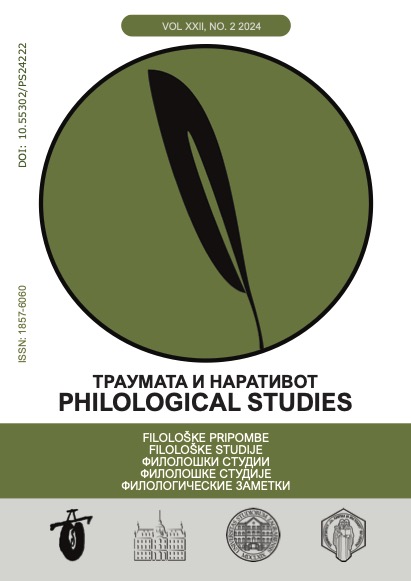A BRITISH DOCUMENT ON THE DIPLOMATIC LEGATIONS IN BULGARIA IMMEDIATELY BEFORE THE OUTBREAK OF THE BALKAN WARS
Keywords:
confidential British diplomatic report, H. O. Bax-Ironside, heads of foreign diplomatic missions in Sofia, psycho-physical analysis, political and diplomatic analysis, national interestsAbstract
The task of diplomacy in every state is to guide and regulate its relations with other international actors, primarily through peaceful means, communication, and negotiation. At the same time, one of its key functions is to inform and analyse — essentially, to collect information from or about other countries, analyse it, and submit it to the Ministry of Foreign Affairs. This very function of diplomacy is the focus of the document presented in this paper. This confidential report, dated January 1912, was sent by H. O. Bax-Ironside, a diplomatic representative of the United Kingdom holding the rank of Envoy Extraordinary and Minister Plenipotentiary in Bulgaria, to the British Foreign Secretary, Edward Grey. It contains an analysis of the diplomatic representatives — primarily of the Great Powers and Balkan states — stationed in the Bulgarian capital who were serving in that role during 1911 (namely, the representatives of France, Italy, Greece, Germany, Russia, Serbia, Austria-Hungary, Turkey, and Romania).
The detailed analysis presented in this document clearly demonstrates that Bax-Ironside was an experienced diplomat who conducted a remarkably precise psycho-physical evaluation of his colleagues, as well as an assessment of their political and diplomatic capabilities. This is especially important given that psycho-physical analysis plays a key role in understanding the behaviour, intentions, and decisions of foreign states and their leaders, ministers, diplomats, and consuls. Furthermore, such analysis serves as a tool for forecasting reactions and adjusting diplomatic strategies accordingly. In this context, the British diplomat analyses his colleagues’ thought processes, communication styles, values, traumas, ambitions, and their responses in crisis situations, under pressure, or during negotiations.
Downloads
References
Државен архив на РС Македонија, фонд Форин офис, Дипломатски извештаи за историјата на Македонија (Foreign Office, Diplomatic Reports on the History of Macedonia), сиг. М 1959.
Авдеев, В. А. „Неклюдов Анатолий Васильевич“, Большая российская энциклопедия. https://old.bigenc.ru/domestic_history/text/2257309
(accessed May 31, 2025).
Бајин, Зоран Д. (2016). Мирослав Спалајковић (1869-1951): биографија (докторска дисертација) [Bajin Zoran D. Miroslav Spalajković (1869-1951): A Biography (Doctoral Dissertation)]. Nacionalni repozitorijum Disertacija u Srbiji.
https://nardus.mpn.gov.rs/handle/123456789/6185?locale-attribute=sr_RS (accessed May 29, 2025) (In Serbian)
Де Боздари, Александар. (2021). О Балканским ратовима, о Великом рату и о неким догађајима који сум им претходили (дипломатске забелешке). Пр. др Мила Михајловић. Медија центар „Одбрана“, Београд.
Escott, T.H.S. (Tomas Hay Sweet). (1908). The Story of British Diplomacy: Its Markers and Movements. London, T. Fisher Unwin.
https://www.culturaldiplomacy.org/academy/pdf/research/books/public_diplomacy/Story_Of_British_Diplomacy.pdf (accessed June 8, 2025).
Jones, Raymond A. (2006). The British Diplomatic Service: 1815‒1914. Wilfrid Laurier University Press, Waterloo. https://muse.jhu.edu/book/49947 (accessed June 7, 2025).
Махмурян, Гаянэ. (2022). “Об отказе османского правистельства от Батумского договора 1918 г.”, Вестник общественных наук 3/2022, Институт истории НАН РА, 9‒26.
https://arar.sci.am/dlibra/publication/366583/edition/340348/content (accessed May 31, 2025)
Неклюдов, Анатолий Васильевич.
http://www.rusdiplomats.narod.ru/ambassadors/sementovskiy-k-dk.html (accessed May 31, 2025).
Temizer, Abidin. (2021). “The Independence Process of Bulgaria and the First Ambassador of the Ottoman Empire in Sofia”, Belleten 85, no. (2021): 1073-1104. https://doi.org/10.37879/belleten.2021.1073 (accessed May 31, 2025).
The Psychological Assesment of Political Leaders: With profiles of Sadam Hussein and Bill Clinton. (2003). Edited by Jerrold M. Post, MD. The University of Michigan Press, Ann Arbor.
Vienna Convention on Diplomatic Relations 1961. Done at Vienna on 18 April 1961. Entered into force on 24 April 1964. (2005). United Nations, Treaty Series, Vol. 500.
Downloads
Published
Issue
Section
License
Copyright (c) 2025 Liljana Guševska, Todor Čepreganov

This work is licensed under a Creative Commons Attribution-NonCommercial-NoDerivatives 4.0 International License.
Philological studies © 2019. This work is licensed under a Creative Commons Attribution-Noncommercial-No Derivative Works 3.0 Unported License


